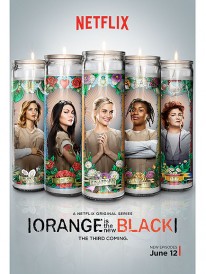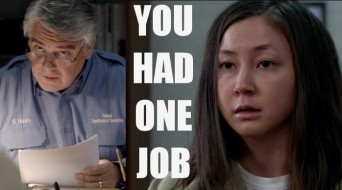
BY FRANCESCA LEWIS
Lesbian.com
Though it was criticised for being too light, an intentional shift by creator Jenji Kohan after the dark reign of Vee in season two, the third season of Orange is The New Black still packs some political punches. Amid the genius silliness of Suzanne’s erotic masterpiece Time Hump Chronicles and Piper’s soiled panty business “Felonious Spunk”, there are some real issues being quietly raised this season.
1. Big Boo’s Family Tension Over Her Butch Presentation
Season three sees all of the characters, especially those usually on the sidelines, gaining much-needed depth, and one of the best examples of this is Big Boo. Her friendship with Pennsatucky brings out her nurturing mama butch side, which is as touching as it is badass, but it’s her flashbacks that finally provide her with the nuance afforded to many other characters from early on. A key feature of this season’s flashbacks has been how surprising they are, not just in playing against our assumptions about characters, but in challenging our ideas and raising issues not often discussed. Homophobia has been explored many times before and yet the story of Big Boo’s struggle to be her authentic self, in the face of overt rejection from her mother and manipulative coaxing from her father, feels fresh and important to see. This is because it reminds us that being queer is not just about sexuality and that gender roles are imposed not only by society at large but by our families. Big Boo’s is a seldom-told story of how harmful it is to stifle a person’s right to self-identify and be their authentic self.
2. MMR’s Soulless Corporate Takeover of Litchfield
The most obviously political real life issue this season is the prison’s new evil overlords, MMR, a profit-hungry company that cuts every corner and cares nothing for the well-being of inmates or staff. In real life, corporate giants like Corrections Corporation of America and The Geo Group, both of which manage 60+ US prisons, make billions of dollars while conditions deteriorate and inmates suffer. The inclusion of this issue in OITNB allows for the human impact of this growing problem to be explored. Unlike State-run prisons, that may or may not care about their inmates but are regardless often underfunded and overcrowded, private prisons have the means to make safe and enriching environments for prisoners, but as we see in the painful boardroom scene this season, all they care about is the bottom line. The MMR takeover of Litchfield is a perfect, hilarious and disturbing glimpse into what privatization really does to the prison system and the people within it.
Soso’s story was the one I felt myself identifying with most. As a mixed race oddball, I sometimes struggle to know where I fit in with social groups and have had my fair share of run-ins with clueless semi-educated therapists. Throughout the season, Soso’s pot of rejection, depression and loneliness is stirred and stirred, threatening to boil over at any moment. When she seizes the chance to steal Benedryl from the doctor prescribing her depression meds, an important point is made: whatever you think about medicating depression and how well it works, if it is not accompanied by therapy with a person the patient can trust, she will feel unheard, alone and possibly suicidal, perhaps rendering the meds tragically redundant. The issue is not that Healy was so quick to recommend pharmaceuticals – though that in itself is an important issue – but that he, unlike Berdie, invalidated Soso’s feelings and made her feel powerless. Soso’s journey provides a powerful reminder that it is absolutely critical to listen to people in crisis, especially when that’s like your whole job, and not fob them off with platitudes and medication.
4. Pennsatucky’s Abuse
The Pennsatucky of season three is almost unrecognisable from the cartoonish punchline of the first season. Like one of those “I need feminism because…” images come to life, Dogget’s flashbacks and her abuse at the hands of new, untrained, unvetted guard Coates are a depressing microcosm of the sexism women face throughout their lives. From her mother’s well-meant and terrible advice upon her first period that she is basically a walking vagina waiting to be used by men, to her stint bartering sex for Mountain Dew, to the horrific rapes she endures, her life highlights the consequences of the objectification of women and the prevalence of rape culture, which dictates that consent is not an issue and sluts are asking for it. The show’s sensitive handling of these events, particularly the depiction of sexual assault, honouring the complexity and never feeling voyeuristic, is admirable and an example shows like Game of Thrones would do well to follow. Dogget’s experiences show the lifelong struggle for women to claim their bodies and be safe in the company of men.
5. The Hate Crime Against Sophia & What Happens Next
Laverne Cox is a superstar, everyone wants to be her BFF, and the character she plays on OITNB is a fan favourite while providing much needed visibility for the transgender community. Sophia is universally loved by viewers and inmates alike, but this season the show chose to go deeper and explore what happens when a transgender person steps outside the role cis people have carved out for her. Up until now, Sophia has been a sideline character, never really caught up in the hijinks of the group, not really affiliated with any of the cliques, just the jolly diva in the salon. With her third season storyline, which sees her struggle to parent an increasingly misogynistic and homophobic son from behind bars and maintain the good will of fellow inmates following a fight with another woman, we learn that acceptance isn’t always permanent and that in our current society, a trans person can have her rights taken away in the blink of an eye. In this moment of shallow transgender acceptance Sophia’s story raises some tough questions about what a real ally is.
Francesca Lewis is a queer feminist writer from Yorkshire, UK. She writes for Curve Magazine and The Human Experience as well as writing short fiction and working on a novel. Her ardent love of American pop culture is matched only by her passion for analyzing it completely to death.







